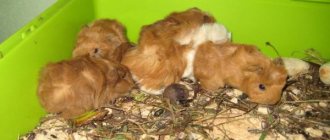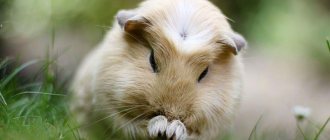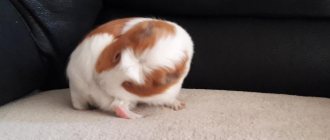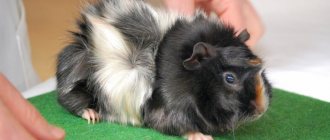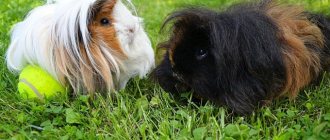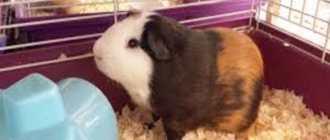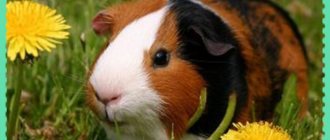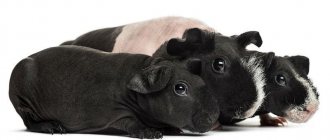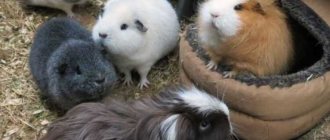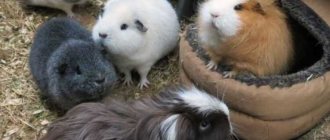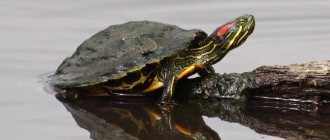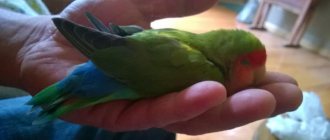Guinea pigs are naturally healthy and rarely get sick. But no one is protected from bacteria and viruses. Diarrhea is a serious reason to check the diet and living conditions. It is advisable to contact a veterinarian immediately. The fact is that your pet has a very fast metabolism, which can quickly lead to dehydration. In a short time, the body becomes exhausted and without timely help can die. The most common cause of diarrhea in guinea pigs is improper grooming.
Factors that provoke diarrhea
There are not many reasons that can cause diarrhea in a guinea pig. However, they can cause serious harm to the health of the animal and even take its life:
- bacterial or viral infection;
- parasitic infestations;
- poisoning with poor quality food or toxic substances;
- entry of a foreign object into the digestive organs;
- drinking stale water;
- sudden transition to a new diet;
- stress;
- overfeeding the rodent;
- liver diseases;
- dental problems;
- taking antibiotics.
Associated symptoms
An attentive owner can easily detect that a guinea pig has diarrhea. Signs of diarrhea are:
- increased frequency of loose bowel movements with foam, mucus and foul odor;
- the fur near the anus is dirty and matted;
- the abdominal area is painful on palpation;
- You can hear rumbling - this is a sign of increased gas formation.
Attention! A pig may develop loose stools if succulent food predominates in its diet. In this case, no mucus, foam or blood will be found in the stool, and the general condition of the rodent will remain normal.
With true diarrhea, as a rule, other signs of illness appear:
- refusal to eat;
- apathy, depression, lethargy - the pig constantly lies in the corner and shows no interest in communication and games;
- temperature increase;
- deterioration in the appearance of the coat - it looks unkempt and disheveled.
Nutrition correction
To speed up the treatment of diarrhea, you need to make adjustments to the guinea pig's diet. Products that cause active fermentation are excluded from the usual menu. During treatment, there is no need to feed the animal bread and crackers. Store-bought products include sugar and starch, therefore they are a favorable factor for the development of pathogenic microorganisms in the intestines. You should not give juicy foods, cucumbers and salads; you need to replace them with hay, hard vegetables, and grains. Legumes should be avoided.
If you refuse to eat, try feeding your pet through a syringe by preparing a creamy mixture.
After recovery, introduce vegetables into the menu in small doses. If diarrhea recurs, be sure to have your stool tested.
Diagnostic methods
When making a diagnosis, data from the anamnesis, clinical examination and research results are taken into account. The veterinarian takes into account the conditions in which the rodent is kept and its nutrition. The doctor should find out if the guinea pig has recently taken any medications.
Often, even when collecting an anamnesis and during an examination, it is possible to identify pathologies of cecotrophy and diseases that are usually accompanied by diarrhea. If necessary, additional studies will be carried out:
- clinical and biochemical blood test;
- X-ray of the abdominal organs;
- stool analysis and culture;
- Ultrasound of the gastrointestinal tract.
Antibiotic toxicity
The use of antibacterial drugs often leads to stool upset in guinea pigs. Many medications have a toxic effect on the intestines. In addition, during a long course of antibiotic treatment, the natural microflora is suppressed and the number of the fungus Candida albicans increases. This leads to severe diarrhea.
For this reason, antibacterial drugs are prescribed only in cases where it is really necessary. It is advisable to first conduct a bacterial culture and test for the sensitivity of pathogenic microflora to antibiotics.
Fluoroquinols are considered conditionally safe drugs for guinea pigs:
- Enrofloxacin;
- Marbofloxacin;
- Chloramphenicol.
Attention! The use of probiotics while taking antibiotics reduces the risk of toxemia.
Non-antibiotic-dependent dysbiosis
Enterotoxemia can be caused not only by taking antibiotics, but also by other reasons:
- stressful situation;
- abrupt transition to new food;
- changes in the composition of intestinal microflora.
In each of these cases, the appearance of diarrhea is an optional condition. Diarrhea may not occur with enterotoxemia. However, signs of deterioration in the guinea pig’s health are still present; the main thing is to detect them in time.
This:
- sudden weight loss;
- dehydration;
- depressive state.
Prevention
It is about preventing the disease.
- First of all, it is necessary to comply with the conditions of detention. If the cage is constantly cleaned and disinfected, then there can be no talk of any infection or invasion.
- It is important to plan the feeding diet correctly. It must fully comply with established standards.
- You should never suddenly change food from one to another, or use spoiled, rotten, or poor-quality food in your diet.
- The animal must be fed strictly at the same time.
- Children are periodically given probiotics to maintain and restore intestinal microflora.
- Once a quarter, additional vitamins and microelements are included in the diet to increase the body’s resistance to infections; These same drugs promote normal digestion.
- It is worth giving your pet walks around the apartment more often. If this is not possible, then set up a spacious terrarium so that the animal can actively move around in it.
- A newly acquired animal is always quarantined before being released into a common cage with other rodents. During isolation (at least two weeks), the pet’s general condition and behavior are monitored. At the slightest suspicion of a disease, refer it to a specialist.
Bacterial and viral infections
Diarrhea in a rodent can be caused by viruses or bacteria entering the body. So, in guinea pigs, diarrhea occurs due to the following diseases:
| Disease | Description and symptoms |
| Coronavirus | The disease affects young animals that have recently been weaned from their mother and is accompanied by diarrhea, weight loss and dehydration. Often pigs die suddenly. |
| Salmonellosis | The disease is rare in guinea pigs, but has a high mortality rate, killing every second animal. The infection is transmitted through contaminated food and drinking water. With salmonellosis, the feces become soft and acquire a yellow-green tint, the animal quickly loses weight, looks weakened, and the fur becomes ruffled. Some rodents develop conjunctivitis and females abort. |
| Colibacillosis | The causative agents are pathogenic strains of Escherichia coli. After infection, the pig becomes lethargic, refuses food, and profuse diarrhea with blood begins. The condition is rapidly deteriorating, rodents are dying from intoxication. |
| Tayser's disease | The causative agents are clostridia. Young animals, weakened and stressed animals are at risk. Clinical signs are apathy, unkempt fur, and watery diarrhea. |
| Pseudotuberculosis | This disease is in no way related to tuberculosis; it is caused by other bacteria. Among the symptoms, in addition to watery diarrhea with bloody inclusions, conjunctivitis, convulsions, and depression are observed. |
Of the parasitic diseases that cause diarrhea, the most common in guinea pigs are:
Parasitic:
- Cryptosporidiosis. Pathogens are simple microorganisms that affect the small and large intestines. Young guinea pigs and individuals with weakened immune systems are susceptible to the disease. In addition to diarrhea, rodents experience slower growth, emaciation, and their fur takes on a sloppy appearance.
- Coccidiosis. The causative agents are Eimeria. They parasitize the intestines. Coccidiosis mainly affects pigs weaned from their mother. Rodents develop colitis, which is accompanied by watery diarrhea.
Coccidiosis
Why do guinea pigs get sick?
Diseases in guinea pigs are associated with poor diet, infections and lack of vitamins. These can be infectious diseases that affect the animal’s body, getting to it with food and water. Another cause of disease lies in improper feeding. Some foods can cause intestinal upset, and its long-term manifestations result in the death of the animal. The third reason is the structural features of her body, which should be taken into account during care. Treatment by a veterinarian prolongs the life of your pet.
The peculiarity of these rodents is their long intestines, which become upset after a change in diet, and teeth, which grow throughout their lives and require constant grinding. They need to be fed hay every day to keep their teeth and intestines normal. The body of these animals does not absorb vitamins well, so special attention should be paid to the food. These ancient animals cannot tolerate penicillin, which becomes a deadly poison for them. Therefore, moldy food is not suitable for them. Guinea pigs need to chew something constantly to keep their digestive system healthy. These rodents live up to seven years, and those who live in a pack live longer than solitary individuals.
First aid at home
A veterinarian should treat diarrhea in pigs. But it is not always possible to immediately get an appointment with him, so you need to know about the methods of providing first aid to the animal. First of all, a sick rodent must be isolated from its cage neighbors. The drinking bowl should be filled with water with the addition of potassium permanganate. It should be light pink. If the pig does not drink on its own, the solution is poured into the mouth from a syringe without a needle.
Activated charcoal is used to cleanse the intestines of toxins. A quarter of the tablet is crushed and dissolved in 25 ml of water. The pig is given 2-3 ml of the prepared medicine to drink. You can also use Smecta. The contents of the bag are divided into 6 parts and diluted in water. This mixture is used to feed the rodent several times a day.
To strengthen stool and relieve inflammation, herbal decoctions of chamomile flowers and oak bark are used. Prepare them according to the instructions on the package. You can give your rodent some rice water to restore stool. Diarrhea leads to rapid fluid loss. It is important to ensure that your pet drinks plenty of water. If the pig does not approach the drinking bowl, you will have to solder it with Regidron from a syringe.
During treatment, to restore healthy intestinal microflora, the animal is given probiotics for rodents. They are sold in veterinary pharmacies. Bacteria are not suitable for humans and pigs.
Important! If the guinea pig's condition does not improve, immediate veterinary attention is needed. The animal may be suffering from an infectious disease rather than ordinary food poisoning. In this case, antimicrobial therapy should be started as quickly as possible.
Diet
When treating diarrhea, it is important to remove juicy foods from your guinea pig's diet. You cannot feed your pet sprouted grains, fresh herbs, vegetables and fruits. The healthiest food for diarrhea is hay. There should always be clean water in the drinking bowl. This is important to prevent dehydration. After the stool is restored, you can gradually transfer the rodent to a normal diet.
Juicy food is included in small portions.
Diet for diarrhea
After providing first aid, you need to make adjustments to the diet. Eliminate all foods that can cause fermentation. Avoid crackers, bread, salads, cucumbers, peas, beans, cabbage and radishes.
The optimal food during this period will be hay and dried greens. It is recommended to give herbal infusions and chamomile decoction.
Vegetables, herbs and other succulent foods can be returned only after the rodent’s health has significantly improved. At the same time, it is worth adding apples, carrots, branches of cilantro and dill to your daily menu.
